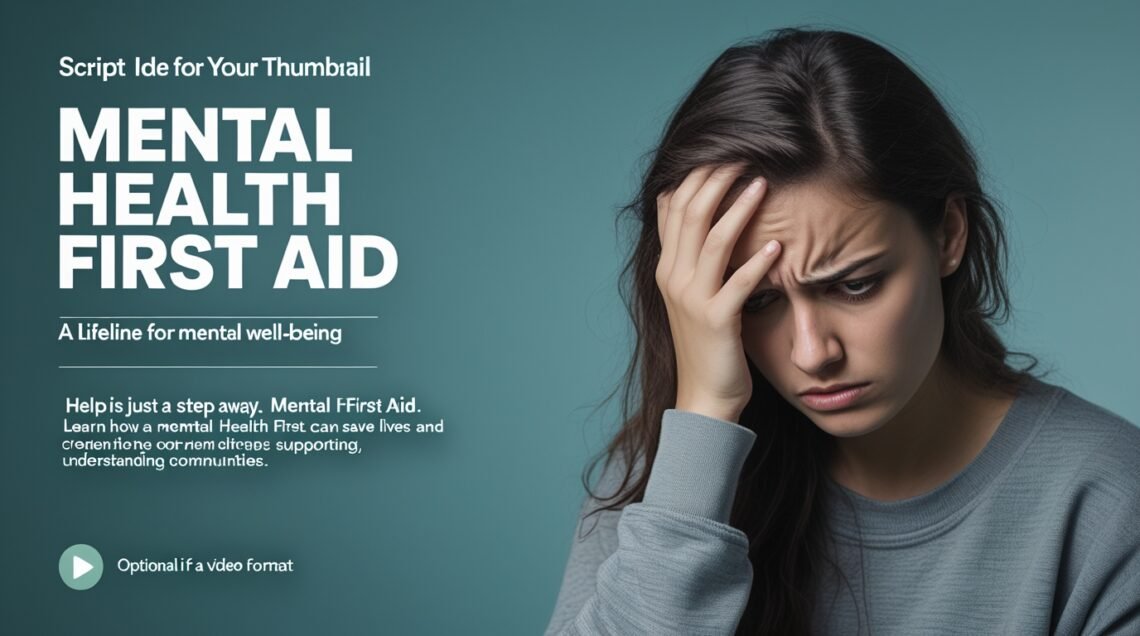Health concerns are a significant problem for millions of people across the globe, and they can lead to serious consequences if not properly addressed. In countries such as the USA, the UK, and many others, mental health issues are rapidly increasing and becoming a major concern. Mental Health First Aid (MHFA) is an essential program designed to provide people with the knowledge and skills necessary to efficiently address mental health issues.
Table of Contents
What is Mental Health First Aid?
Mental Health First Aid is an internationally renowned training program designed to help those facing mental health issues. Much like Medical First Aid, MHFA offers immediate assistance for those concerned about their mental health until qualified medical professionals are available. It is designed to deal with various mental health issues such as psychosis and bipolar disorder.
Key Benefits of Mental Health First Aid
1. Early Intervention
MHFA helps in identifying mental health issues earlier, preventing them from becoming severe conditions that could result in hospitalization, dependence on drugs, or self-harm.
2. Creating Supportive Communities
MHFA fosters empathy and compassion, ensuring that individuals with mental health problems are supported and treated as integral members of their community, family, and society.
3. Promoting Well-being in the Workplace
Mental health issues can significantly impact work productivity and lead to absenteeism. MHFA training ensures that employees are equipped to assist their colleagues, contributing to a healthier and more supportive work environment.
4. Breaking the Stigma
MHFA plays a vital role in reducing the stigma associated with mental health by educating the public about the importance of addressing mental health concerns openly.
Topics Covered in Mental Health First Aid Training
1. Understanding Mental Health
Mental health refers to emotional, social, and physical well-being. It affects our thoughts, feelings, and behaviors. MHFA training addresses common mental health issues such as depression, schizophrenia, and anxiety, providing participants with a deeper understanding of these conditions.
2. Recognizing Warning Signs and Symptoms
MHFA teaches participants how to recognize mental health issues, often reflected in changes in behavior, mood, and functioning. These may include withdrawal from social activities, extreme mood swings, or engaging in risky behavior.
3. Supporting Someone in Crisis
Participants are taught how to offer immediate support during emotional health crises, such as panic attacks, suicidal thoughts, or psychotic episodes, providing reassurance and de-escalation strategies.
4. The Role of Professional Help
While MHFA provides initial support, it emphasizes the importance of professional help. Participants are trained on how and when to refer individuals to healthcare providers, therapists, or emergency services for further assistance.
5. Mental Health First Aid for Specific Groups
Certain versions of MHFA training focus on specific groups, such as adolescents, children, or those dealing with specific mental health conditions like bipolar disorder and PTSD. This ensures that the training is tailored to meet the unique needs of various populations.
The Global Impact of Mental Health First Aid
United States:
In the U.S., Mental Health First Aid has become an integral part of mental health education in workplaces, schools, and healthcare systems. Some states have incorporated MHFA into their public health initiatives to address the growing mental health crisis, ensuring that individuals are better prepared to support others in need.
United Kingdom:
The UK is a strong advocate of Mental Health First Aid, with programs available for the general public, workplaces, and educational institutions. The National Health Service (NHS) promotes MHFA as an essential tool for improving the mental health and well-being of the nation’s citizens.
Other Countries:
Countries such as Australia, Canada, and India have recognized the importance of MHFA and have adapted the program to suit local needs. These nations are using various versions of the MHFA program to increase accessibility and awareness of mental health issues worldwide.
How Can You Get Involved?
1. Take MHFA Training:
Find an approved MHFA training program in your region. There are numerous schools and organizations offering in-person or online courses that are internationally recognized.
2. Implement MHFA in the Workplace:
Encourage your employer or HR department to provide MHFA training for employees. A mentally healthy workplace can lead to greater productivity and lower absenteeism.
3. Raise Awareness:
Share information about MHFA with your friends, family, and colleagues to help create an open, supportive community where mental health issues are addressed and understood.
4. Volunteer or Advocate for MHFA:
Get involved by volunteering to help spread the word about MHFA, or support initiatives that raise awareness about mental health. The more people who are trained, the more we can work towards creating a supportive environment for everyone.
Frequently Asked Questions (FAQ)
1. What is the purpose of Mental Health First Aid?
The goal of Mental Health First Aid is to equip individuals with the skills and knowledge to assist people experiencing mental health issues or crises. The program is designed to reduce the stigma surrounding mental health and offer immediate support until professional help is available.
2. How long does it take to complete Mental Health First Aid training?
Mental Health First Aid training typically lasts 8 hours, often split into one or two days. Some versions of the training, such as those designed for youth or workplaces, may differ in duration.
3. Who should complete Mental Health First Aid training?
While anyone can enroll in MHFA training, it is particularly beneficial for educators, healthcare professionals, and individuals working in customer service or community outreach roles who may interact with people experiencing mental health challenges.
4. Is Mental Health First Aid the same as professional therapy?
No, Mental Health First Aid is not a replacement for therapy or professional help. It is intended to provide initial support and guidance until a qualified healthcare professional can take over.
5. Can Mental Health First Aid prevent mental health issues?
While MHFA cannot prevent mental health problems, it plays a key role in early intervention. Recognizing the signs of mental health issues early and offering support can help prevent conditions from worsening, leading to better outcomes for those affected.
Conclusion
Mental Health First Aid is a crucial tool for fostering a more inclusive, empathetic society. By educating people about mental health and equipping them with the skills to support others, we can reduce the negative impact of mental health issues on individuals and communities. Whether you’re in the United States, the United Kingdom, or anywhere else, becoming trained in MHFA can make a significant difference in the mental well-being of those around you.
If you’re ready to make a positive impact on the mental health of your community, consider enrolling in a Mental Health First Aid course today. Together, we can build stronger, healthier communities.




Leave a Comment